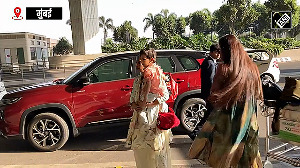Atomic Energy Commission Chairman Anil Kakodkar on Wednesday said India should not "bother" if the proposed Indo-US civil nuclear agreement does not come through and also asserted that New Delhi would not accept any proposal that does not allow reprocessing of spent fuel.
"I have only told you what the Indian position is. If within that... if everything... there is an agreement, it will come very soon. If it (the deal) doesn't (come through), don't bother. Indian programme is going on," Kakodkar, also secretary in the Department of Atomic Energy, said when asked how soon he expects the deal to come through.
On reported US concerns regarding spent fuel and whether the issue has been resolved, he said New Delhi is not going to accept anything which does not allow reprocessing.
Speaking to reporters after inaugurating the Emergency Response Centre at Atomic Minerals Directorate for Exploration and Research in Bangalore, he said spent fuel cannot be left as spent fuel in perpetuity.
"That's part of Indian policy. We have adopted the closed nuclear fuel cycle which is getting broader. So, we are not going to accept it if there is no recycle of the plutonium and uranium that's there in the spent fuel because it's required even from the environmental point of view and even from the point of view of credible waste management. Recycling of spent fuel is important. We are not going to accept anything which does not allow (reprocessing)," he said.
Kakodkar said some discussions have been held with the International Atomic Energy Agency with regard to India-specific safeguards.
"As far as we are concerned... on our part, we have identified a separation plan, which has been discussed and agreed by the two sides," he said.
Noting that as per the July 18, 2005, agreement between India and the US, the latter is to amend its laws and also have the guidelines of the Nuclear Supplier Group amended so that civil nuclear agreement with India can start, Kakodkar said, "These processes are taking place in the US Congress and we have to await the outcome of these processes."
He said the agreement should be seen from the perspective of Indian interests, which would be met in the final treaty.
"We have to look at this from Indian interest point of view. Our interest is we should be able to carry forward our own programmes... the domestic research and development programmes because we should be able to open up three-stage nuclear programme to its full potential... we should be able to carry out our strategic programme... While we must be able to carry out the domestic programme exactly as per what we have been planning and what we have been working on, we are also keen that international cooperation opens up (so that) we get additional energy resources for nuclear power. Finally, when we come to an agreement, we will of course ensure that Indian interests are fully met," he said.






 © 2025
© 2025